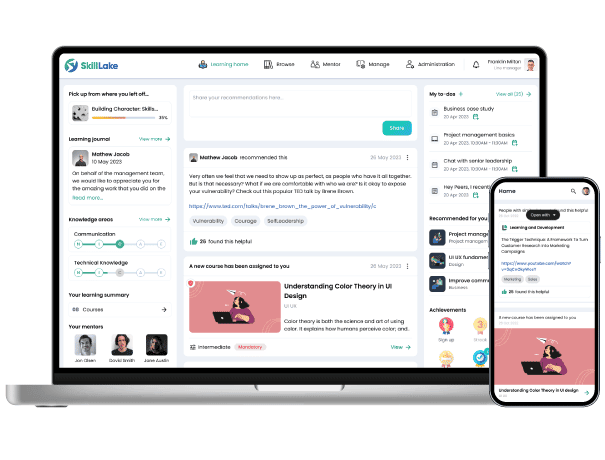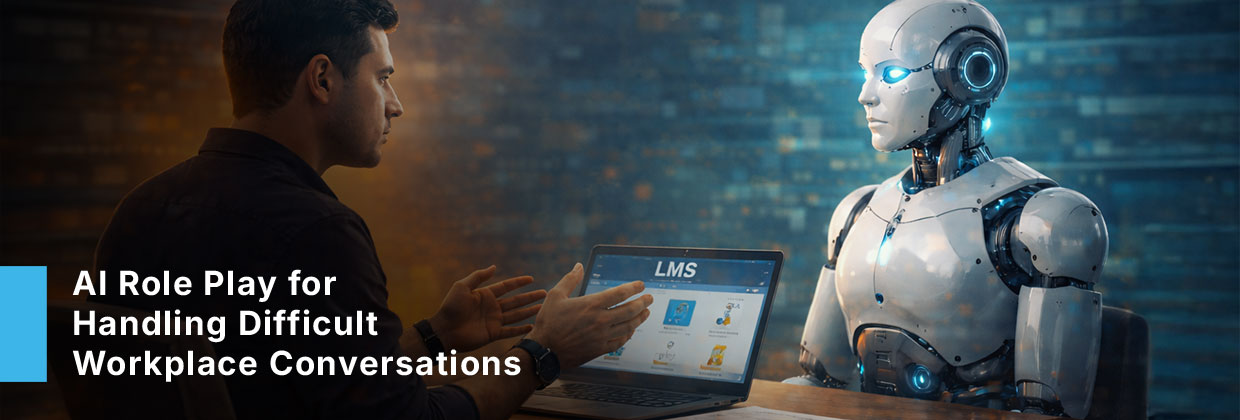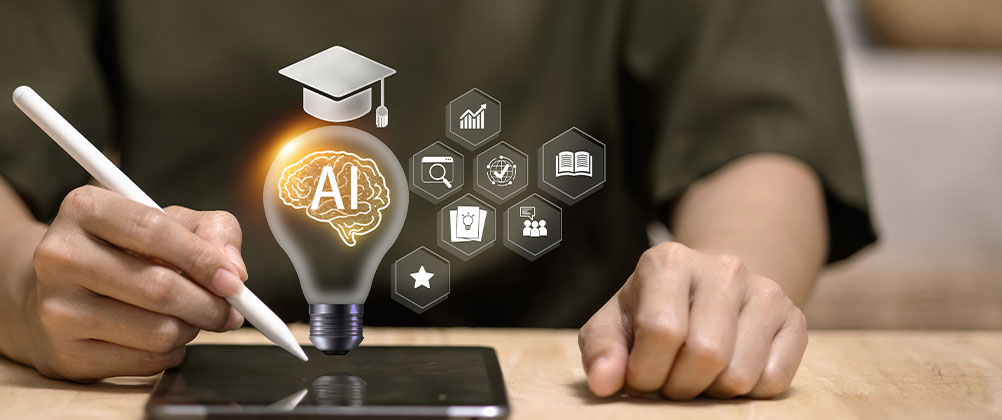How Can HR and Leadership Help Employees Adopt AI?

An increasing number of CEOs, around 66%, recognize the potential advantages of integrating AI into their HR departments. Similarly, 52% of HR leaders actively seek ways to improve the employee experience through AI-driven solutions. This acknowledgment arises from the understanding that AI can significantly enhance various aspects of HR management.
HR leaders strategically utilize AI in employee engagement to achieve specific objectives. About 37% of HR leaders use AI to drive cost reduction initiatives, while 28% focus on leveraging AI’s capabilities to strengthen learning and development initiatives within their organizations. These statistics highlight the multifaceted role of AI in organizations, from optimizing cost-efficiency to enhancing employee growth and development.
AI continues to reshape the workplace, with HR and leadership playing a crucial role in guiding employees through this transformation. To successfully integrate AI into the workplace, HR and leadership must foster a culture of continuous learning within the organization. This involves promoting a mindset of adaptability and openness to change among employees and implementing AI in learning and development. It’s essential to convey that AI is not a threat to job security but rather a tool that can enhance their capabilities and streamline their tasks.
AI: A Paradigm Shift and the Future of Lasting Innovation
The significance of AI in today’s technology landscape cannot be overstated, and statistics underline its enduring presence and transformative potential.
- AI Adoption: A substantial 40% of organizations have embraced AI to varying degrees, integrating it into their operations.
- Future Investments: 72% of organizations plan to invest in AI within the next three years. This strong commitment reflects the recognition of AI’s long-term significance.
- Job Creation: AI is set to make a remarkable impact on the job front, with projections indicating the creation of 9 million new jobs in the United States alone by 2025. This figure underscores AI’s substantial and lasting influence on the workforce.
Statistics not only reaffirm the significance of AI but also emphasize its enduring presence in the technology landscape. AI’s dynamic evolution and inherent unpredictability position it as a powerful force for transformation in the future workforce. This necessitates organizations to prioritize cultivating adaptability and strategic readiness within their workforce, paving the way for thriving in an AI-driven future workforce.
Continuous Evolution
AI constantly evolves, with each interaction providing an opportunity for growth. Unlike static technologies, advanced AI tools are designed to learn and improve over time. This dynamic nature requires a workplace culture that prioritizes ongoing learning and adaptability. As a recent Harvard Business Review article highlights, employees must learn to use AI initially and continuously adapt to its evolving capabilities. AI skill development empowers employees by enhancing their skills, career prospects, job satisfaction, and productivity. It also contributes to the organization’s success and resilience in the face of technological changes, creating a win-win scenario for employees and the company.
Unpredictable Changes
AI’s potential applications are vast and, at times, unpredictable. Foreseeing the full spectrum of how AI will be utilized in the future is challenging. This inherent unpredictability makes working with AI exciting and challenging, as it constantly presents new opportunities for growth and transformation. Organizations can proactively prepare for unforeseen shifts in the future of AI-driven work. This involves several key initiatives:
- Fostering a corporate culture that values adaptability is essential. Encouraging employees to be open to new technologies and ideas, with visible support and leadership from management.
- Diversifying AI skill sets across the organization is advisable. Cross-training employees to develop a broader understanding of AI technologies and their applications is crucial.
- Offering continuous learning opportunities to employees, including support for certifications and skill acquisition, helps them remain up-to-date with AI advancements.
- Collaboration with AI experts, research institutions, and industry peers is pivotal. Such partnerships provide insights into emerging AI technologies and access to cutting-edge solutions.
How Can HR and Leaders Facilitate A Smooth Transition To AI Adoption Within Our Organization?
As AI revolutionizes industries and reshapes the workplace, organizations must proactively embrace this transformative technology to stay ahead of the curve. However, integrating AI into existing workflows and empowering employees to adopt these new tools can be daunting. Organizations should implement actionable strategies to address employee concerns, foster a learning culture, and provide the necessary support to ensure a smooth and successful AI transition.
Establishing a Clear AI Framework
Developing a strategic approach to AI is as vital for a company as having marketing or growth strategies. Establishing a clear internal and external AI strategy is crucial for reassuring employees about AI’s role in company operations and demonstrating your distinctiveness to stakeholders and investors. Regarding internal AI utilization, defining areas where AI will not be involved and where human intervention will always be necessary is essential. The level of AI integration and trust within your company’s operations also depends on the specific AI services you employ.
On the external front, assess how your competitors leverage AI and explore innovative approaches to differentiate yourself. Also, be clear on how your company applies AI on its website to educate potential customers and clients. While appointing a Chief AI Officer might seem ambitious, it’s crucial to recognize that the growth in AI adoption is exponential.
Empowering Employees through Flexibility and Support
With the growing influence of AI, employees may understandably have apprehensions regarding its effects on their roles and skill sets. Organizations should prioritize providing flexibility and support to ensure a harmonious transition and empower employees to excel in this evolving landscape.
1. Training
One crucial aspect is the provision of comprehensive training opportunities. Equipping employees with the knowledge and skills required to engage with AI effectively is essential. By investing in training programs tailored to their needs, organizations can instill confidence and competence, mitigating concerns about job security.

2. Learning Platforms
Offering access to dedicated learning platforms can be instrumental. These platforms facilitate continuous learning and skill development, allowing employees to adapt to AI-driven changes at their own pace. By making such resources readily available, organizations demonstrate their commitment to employee growth and adaptation.

3. Empower Employees to Explore AI Solutions
Employees should feel empowered to explore AI solutions within their roles. This experimentation enhances their familiarity with AI and promotes innovative thinking, potentially uncovering novel ways to leverage AI for business benefit.
Harnessing the STEP Framework for Effective AI Adoption
The STEP framework is a strategic approach organizations use to integrate and leverage technologies in the workplace effectively. The framework comprises four interconnected activities, which encompass:-
- The process of categorizing tasks for either AI automation or AI augmentation based on their suitability and complexity.
- Facilitating the seamless transfer of tasks across different work roles, ensuring a cohesive integration of AI into the workflow.
- Providing comprehensive education and training empowers workers to harness AI’s evolving capabilities in their roles.
- Implementing a robust performance evaluation system that reflects employees’ learning progress and their contributions to assisting others.
By adopting the STEP framework, organizations can optimize their AI utilization, enhance workforce skills, and promote a culture of continuous learning and collaboration, ultimately driving improved performance and competitiveness.
Key Insights for Leaders and HR Professionals
Leaders and HR professionals must proactively educate employees about this transformative technology’s intricacies and untapped potential. By fostering a culture of innovation and experimentation, where employees are empowered to explore generative AI tools and envision novel applications, organizations can harness the collective creativity of their workforce to drive business growth.
Moreover, the adoption of generative AI should not be viewed as a mere replacement for human labor; rather, it should be seen as an opportunity to augment human capabilities and unleash a new era of productivity. By embracing the transformative potential of generative AI, organizations can position themselves for success in an ever-evolving landscape of boundless possibilities.
Conclusion
As AI continues transforming the workplace, proactive leadership and strategic HR management are crucial for successful adoption. AI is not a passing trend but a lasting innovation with numerous benefits for organizations. By embracing the transformative potential of generative AI, organizations can position themselves for success in an ever-evolving landscape of boundless possibilities. AI’s dynamic evolution and lasting significance underscore the need for organizations to prioritize adaptability and strategic readiness. This approach will empower employees and ensure that organizations thrive in an AI-driven future workforce, where the fusion of human and AI capabilities unlocks unprecedented potential.
Build a culture of continuous learning with Skill Lake’s state-of-the-art people development platform. Give your employees professional training to help them excel in their job roles and propel your business to greater efficiency and success.
Start Today

Aarathy Jayakrishnan
Aarathy is an e-learning professional and enthusiast with a keen understanding of learning and development concepts. She writes insightful content, unraveling the possibilities that e-learning holds, and strives to make education open for all.